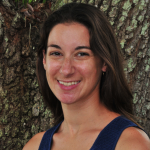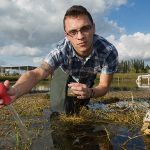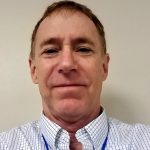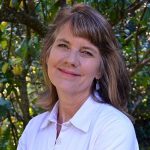Last year’s lingering red tide caused widespread fish kills, economic impacts and environmental damage.
The Thompson Earth Systems Institute at the University of Florida is hosting a free public panel titled “Beyond Dead Fish: How Red Tide Affects All Floridians,” to address the economic, public health and environmental impacts of harmful algal blooms.
The panel will take place Friday, April 26, 2019 from 3 to 4 p.m. at the MacKay Auditorium in Pugh Hall located at 296 Buckman Dr. in Gainesville. No registration is required and attendees are encouraged to arrive at 2:30 p.m. for refreshments. The UF Water Institute and UF Bob Graham Center for Public Service are co-sponsoring the event.
Off-campus attendees can find visitor parking in the Reitz Union parking garage, located at the corner of Museum Road and Reitz Union Drive. The garage is about a five-minute walk to the auditorium.
Those who cannot attend in person can also participate online via live broadcast. Tune in at the following link to attend virtually: bit.ly/UFRedTide
Attendees who plan on participating virtually are encouraged to submit questions to the panelists ahead of time and may email them to earthsystems@floridamuseum.ufl.edu.
For other questions, contact Jennifer Bauer at jbauer@floridamuseum.ufl.edu.
Download the event flier at the following link: More Than Dead Fish: How Red Tide Affects All Floridians
Planning on attending? RSVP on our Facebook event page: https://www.facebook.com/events/2417519538484635/
Panel speakers:

Lisa Krimsky — UF/IFAS Florida Sea Grant water resources regional specialized agent
Krimsky is part of a team that leads and supports water resource extension education programs. Krimsky’s efforts are focused primarily in southeast Florida, with a focus on water quality in coastal and estuarine ecosystems. Her programs help solve water resource issues that are critical to the economic development and environmental protection in Florida.

Dail Laughinghouse — UF/IFAS assistant professor, algae scientist
Laughinghouse is a broadly trained phycologist working with both basic and applied algal research from Tropical to Polar Regions. Some of the current research in his lab focuses on diversity and toxicity of cyanobacteria, environmental influences on macroalgae and microbial photoautotrophs, novel applied uses for algae, bioremediation, and the detection and effects of bioactive compounds.

Andy Reich — scientific advisor to the Chief of the Bureau of Environmental Health at Florida Department of Health
For more than 10 years Reich has lead the Department’s effort to address adverse health impacts from exposures to toxic algal blooms in fresh water and marine environments. His efforts have led to an integrated and collaborative approach to environmental health response in Florida with federal, state, and local partners including NOAA, CDC, Army Corps of Engineers and the US Environmental Protection Agency.
Panel moderator:

Cynthia Barnett — Environmental journalist in residence, UF College of Journalism and Communications
Header image: Florida Sea Grant stock photo